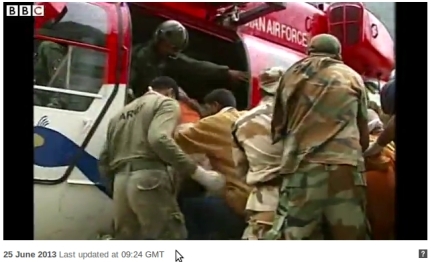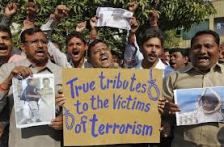The devastating flood in Uttarakhand [1, 2] reminds us, that, if we enter in the disaster prone area we will be engulfed. No GOD can save us. After the huge devastation of people and resources it is obvious that we will shed tears. We will ask our government to take necessary steps. We will ask government to take mitigating measures.

But is it all? Is it what a disaster teaches us? Should we not be more reflective in our own collective action? Or we will simply forget the incidences after a while.
We forgot the lessons learned from recent disasters like Tsunami (in December, 2004) that had hit on the east coast of Indian peninsula and Bihar flood in the river Koshi during 2008 [3, 4]. Usually mass tends to shift their interest from past to recent events and eventually forget the past events. Probably, it is not right to say that people forget. Point is, people tend to reduce their emotional attachment or commitment on a issue over a span of time. The situation would be acceptable for mass or even it would be desirable for some classes of people. But, it is not certainly desirable from a community of people who can act on the situation in a more meaningful way.

The community would include any one who wants to be the part of transformation. The situation like Uttarakhand flood would require serious investigation from multiple dimensions. These devastating calamities should not be viewed as natural disaster. There is another tendency to attribute similar disaster as the consequence of global warming.
Without going into the complex debate about the plausibility of global warming in such floods [5], we do understand that we human have multiplied the seriousness of the situation through our own action.
Consider the example of Uttarakhand flood itself. Let us take the stock of activities we have conducted in this area that are directly or indirectly aggravated the intensity of devastation. We have changed the topography of the region by several ways [9]:
- Infrastructure development like constructing hotels, resorts, roads, human settlement in the flood plain etc. to satisfy economic interest,
- Large scale deforestation,
- Construction of dams and embankments on and across the rivers, and
- Sand and stone mining in rivers.

Photo Courtesy: http://www.bubblews.com
Practically, there is no concern that has been reflected in the planning and implementation of so called “development” in the area. Largely, the “development” is considered with economic growth of the locality as well as of the nation. If the place is of religious interest, people start associating the transformation as an instrument to reach GOD. Unfortunately, people tend to ignore that GOD is helpless to the natural forces similar to human. GOD is a imaginary creation of human and therefore, GOD can not be more powerful than human in solving real world problem.
Probably, there is little point in discussing the relationship between the faith in existence of GOD and occurrence of natural disasters. However, we must understand that what we will do to nature, we have to pay for our deeds. Whether we believe in GOD or not, is immaterial.


It is true that a large number of people’s livelihood depend on the religious tourism [6], and we can not simple ignore these aspects. Finally, we must find optimum measures to plan our course of action. We also need to redefine our understanding about natural disasters [7] and its complex interaction with human intervention. Some times some disasters like flood would appear as natural disaster. Unfortunately, the manifestation of these disasters are intricately related to the human intervention within its natural course. Frequent floods in the major Indian rivers including the recent flood in Uttarakhand are prominent examples of such disaster.

We can not simply witness the disasters and loss of resources including tens of thousands of human and other living beings. There must be a pause of our detrimental acts in the nature. One may ask what should we do now on urgent basis? I would say we must talk to our central and state governments. We must convey our concern that we do not have luxury to recur such incidences. Government must stop all kinds of construction activities in the name of development, that will negatively interfere with the environment. However, to initiate such a bold step Government must have support from the people. So, called developmental model in India is asymmetric in nature and inherently exploitative. Unfortunately, this developmental model has captured large number of people’s vision and prosperity.
“Developmental activities” in Uttarakhand may have captured the dream of large number of people, but on what cost. More important question to be asked is, who pays for the cost? In our existing developmental model, profit and cost is dis-proportionately distributed. The person who makes the profit does not always pay the cost.
Let us take a simple example: the trend of dam construction over Himalayan rivers. The electricity produced from the project is used up by Industry and people located far from the region. The local environment is completely disturbed. People of neighbouring area are displaced from their home land and exposed to the future disaster and altered topography. The people who depend on the natural ecosystem of the rivers had to shift their means of livelihood and often had to engage in bonded labour job. The amount of public money spent in the projects does not give same amount of public profit. The services provided from these projects are accessible to a certain class of people. However, the cost of the projects also comes from the people who do not have access to the services. One such example would be the production of luxury items.
We can elaborate on other examples too. Let us consider that the electricity produced from a dam on Himalayan river is used by a private car manufacturing company. Everyone does not have purchasing power of car. Although, the investment of the project comes from the public fund. We can similarly consider examples of industry that produces medicines, fertilizers etc.


Therefore, any meaningful step in this area must be minimally radical. It requires redefining our economy, our expectation and vision for the individual as well as society. Government must act boldly to combat and mitigate such disasters. But are we prepare to discard existing economic and developmental model? Are we ready to say no to market driven economy based on neo-liberal agenda which has posited every individual as a democratic consumerist with false consciousness about the collective interest?
Due to localised and asynchronous nature of disaster, people do not find enough emotional support to form and develop a collective consciousness to work at systemic level or initiate changes at individual level. Further, our action does not directly manifest in the disaster, however, it manifests in a different way. As a consequence, in a certain way it masks the agents responsible for it. If we do not have enough introspection we will not find ourselves guilty in the entire process and do not feel any need to change our action. And this false satisfaction prevent us to make any meaningful change in our action.
I hope, we will soon realise that we must change and urge government to act meaningfully.
References
- www.wikipedia.org/wiki/2013_North_India_floods
- www.bbc.co.uk/news/world-asia-india-23058651
- www.wikipedia.org/wiki/2004_earthquake
- www.wikipedia.org/wiki/Floods_in_Bihar
- www.redalertpolitics.com/2013/05/30/climate-warnings-growing-shriller-as-global-warming-theories-fall-apart/
- www.thehindu.com/opinion/lead/the-untold-story-from-uttarakhand/article4847166.ece
- www.wikipedia.org/wiki/Natural_disaster
- www.bubblews.com/news/699736-why-the-uttarakhand-tragedy-happened
- www.indianexponent.com/35034/short-sighted-unscientific-development-behind-uttarakhands-man-made-disaster.html
- Selfless soldiers, shameless netas





